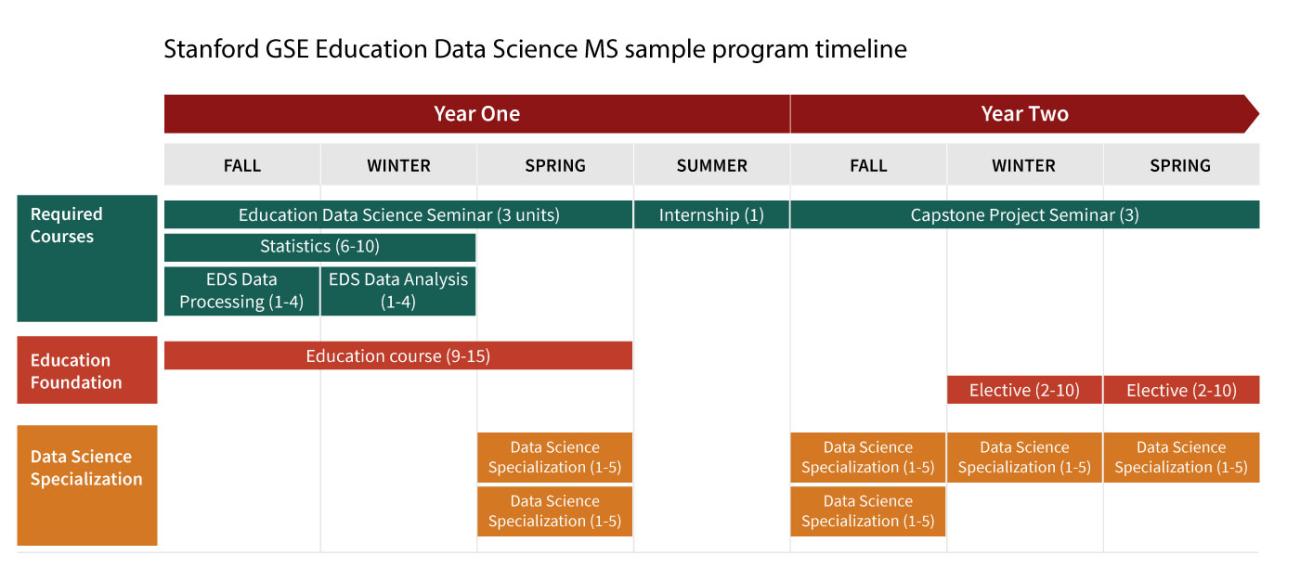Program Information

Overview
Our two-year program is designed for students who want to go deep, allowing time and support to build advanced technical skills and a strong understanding of education research. With a minimum of 51 units in graduate-level coursework, our students complete the most comprehensive curriculum into education data science. Along the way, students benefit from an intimate learning environment through the EDS seminar, collaboration with a diverse cohort of peers, and advise from a faculty advisor. Students also gain real-world experience through internships and hands-on research projects.
Curriculum and coursework
The EDS MS curriculum has been developed to be both rigorous and flexible, preparing students with the knowledge and skills needed to meet their academic and professional goals. Students complete courses in the core curriculum, at least three courses in education, and six or more in (education) data science, drawing from a wide range of offerings across Stanford. Each student can customize the timing and pacing of their coursework within the program requirements. EDS students typically take courses not only within the Graduate School of Education (GSE) but also in departments such as Computer Science, Statistics, and Management Science & Engineering. For detailed information about courses, please consult the EDS MS handbook.

Required courses
Note: All course information is subject to change. Please consult ExploreCourses and Axess for final course offerings.
Education Data Science Seminar
Each quarter, students enroll in the EDS MS Seminar, which introduces emerging topics in education data science and builds a strong learning community. The seminar fosters peer connection, features guest speakers and leaders in the field, and creates opportunities to engage with potential internship providers and employers. It also brings together students and faculty to support each other’s scholarly work and offers space for professional development in areas such as critical thinking, feedback, communication, and time management.
Core Education Data Science Courses
Students will be required to take two courses in statistics in order to employ these analyses in their data science courses later in their course of study. Example courses are EDUC400A, EDUC400B, and EDUC326.
Statistics
EDUC423A and 423B are foundational courses in the EDS curriculum that introduce students to the principles and practices of data processing and analysis, with a focus on applications in education. Students develop technical fluency while critically examining how data is collected, transformed, and interpreted in educational contexts. The courses also emphasize the ethical dimensions of working with education data, preparing students to approach analysis with care, responsibility, and a good understanding of its potential impact on learners and organizations.
Education Data Science Internship
This course is designed around the EDS internship experience. Starting with a suitable internship agreement, students explore personal learning goals, share experiences, reflect on their progress and development, and connect their internship to their past and future academic coursework. Students have completed internships with faculty at Stanford, TeachFX, Newsela, ETS, Go Guardian, Digital Promise, Class.com, and Education Pioneers, for example.
Education Foundation
Students must develop domain expertise to be effective education data scientists. Three required education courses help establish this foundation and connect students' technical training to educational contexts. Students may select courses that focus on an area such as Education Policy and Analysis, Learning Sciences, or Assessment. Students may design with consultation and approval from the MS Program Director a coherent set of education courses that advances their intellectual goals.
Data Science Specializations
Students fulfill this requirement by completing three of five available tracks, each composed of two courses. The areas of concentration offered are Natural Language Processing (e.g., CS124 and EDUC473), Network Science (e.g., EDUC316 and CS224W), Causal Methods (e.g., EDUC430A and DATASCI161), Measurement (e.g., EDUC252 and EDUC353A), and Learning Analytics (e.g., EDUC139 and EDUC407).
Electives
While the first year of the EDS program is primarily focused on building a strong foundation through the core curriculum, students have increasing flexibility in their second year to explore elective courses aligned with their interests. Students are encouraged to choose electives that deepen their expertise in a specialization area, support their capstone project, or expand their understanding of key topics in education data science.
Student Voices
Hear from our students about why they chose to study education data science at Stanford, what their learning journey has been like, and what advice they would give to future EDS students.
What you need to know
Admission requirements
To learn more about requirements for admission, please visit the Application Requirements page.
Financing your education
To learn more about the cost of the program and options for financial support, please visit Financing Your Master’s Degree on the admissions website.
Contact admissions
For admissions webinars and to connect with the admission office, see our Connect and Visit page.



